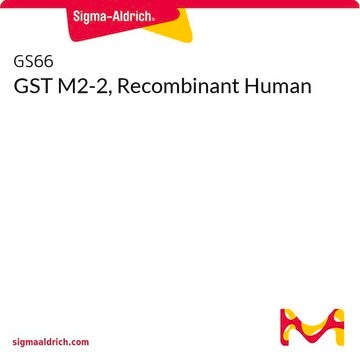GS39
GST T2-2, Recombinant Rat
Synonym(s):
glutathione S-transferase, theta 2
Sign Into View Organizational & Contract Pricing
All Photos(1)
About This Item
UNSPSC Code:
12352200
NACRES:
NA.26
Recommended Products
biological source
rat
Quality Level
recombinant
expressed in E. coli
Assay
>95% (SDS-PAGE)
form
frozen liquid
specific activity
13.18
mol wt
23 kDa
concentration
2.44 mg/mL
storage temp.
−70°C
Gene Information
rat ... Gstt2(29487)
General description
using spectrophotometric determination of NADPH oxidation coupled to the glutathione peroxidase activity of GST T2-2 on cumene hydroperoxide (1.5 mM) in the presence of reduced glutathione (1 mM) in 100 mM NaPO4 (pH 7.0) at room temperature.
Biochem/physiol Actions
Glutathione S-transferase theta 2 (Gstt2) is an enzyme that in rats is encoded by the Gstt2 gene. Glutathione S-transferases (GSTs) are a family of enzymes that play an important role in detoxification by catalyzing the conjugation of many hydrophobic and electrophilic compounds with reduced glutathione. Based on their biochemical, immunologic, and structural properties, cytosolic and membrane-bound forms of glutathione S-transferase are encoded by two distinct supergene families. At present, eight distinct classes of the soluble cytoplasmic mammalian glutathione S-transferases have been identified: alpha, kappa, mu, omega, pi, sigma, theta and zeta. The GSTs are thought to function in xenobiotic metabolism and play a role in susceptibility to cancer, and other diseases.
Storage and Stability
The enzyme should be used by the end-user customer within 1 year of receipt.
Storage Class Code
10 - Combustible liquids
WGK
WGK 1
Flash Point(F)
Not applicable
Flash Point(C)
Not applicable
Certificates of Analysis (COA)
Search for Certificates of Analysis (COA) by entering the products Lot/Batch Number. Lot and Batch Numbers can be found on a product’s label following the words ‘Lot’ or ‘Batch’.
Already Own This Product?
Find documentation for the products that you have recently purchased in the Document Library.
P Jemth et al.
The Biochemical journal, 316 ( Pt 1), 131-136 (1996-05-15)
Rat glutathione transferase (GST) T2-2 of class Theta (rGST T2-2), previously known as GST 12-12 and GST Yrs-Yrs, has been heterologously expressed in Escherichia coli XLI-Blue. The corresponding cDNA was isolated from a rat hepatoma cDNA library, ligated into and
E M Van Lieshout et al.
Biochimica et biophysica acta, 1381(3), 305-311 (1998-09-05)
Nonsteroidal anti-inflammatory drugs (NSAIDs) have been claimed to reduce cancer rates in oesophagus, stomach and colon of humans and laboratory animals. Recently we showed that dietary administration of NSAIDs enhanced glutathione S-transferase (GST) class alpha, mu and pi levels in
Robert Fledrich et al.
Brain : a journal of neurology, 135(Pt 1), 72-87 (2011-12-23)
Charcot-Marie-Tooth disease is the most common inherited neuropathy and a duplication of the peripheral myelin protein 22 gene causes the most frequent subform Charcot-Marie-Tooth 1A. Patients develop a slowly progressive dysmyelinating and demyelinating peripheral neuropathy and distally pronounced muscle atrophy.
Marjorie Coggan et al.
The Biochemical journal, 366(Pt 1), 323-332 (2002-06-01)
A novel Theta class glutathione transferase (GST) isoenzyme from mouse termed mGSTT3 has been identified by analysis of the expressed sequence tag database. The gene encoding mGSTT3 is clustered with the mGSTT1 and mGSTT2 genes on chromosome 10 and has
R C Strange et al.
Toxicology letters, 112-113, 357-363 (2000-03-18)
The glutathione S-transferases (GST) are a supergene family of dimeric, enzymes that catalyse the conjugation of glutathione (GSH) to a variety of electrophiles including arene oxides, unsaturated carbonyls, organic halides and other substrates. Their importance is suggested by the finding
Our team of scientists has experience in all areas of research including Life Science, Material Science, Chemical Synthesis, Chromatography, Analytical and many others.
Contact Technical Service








